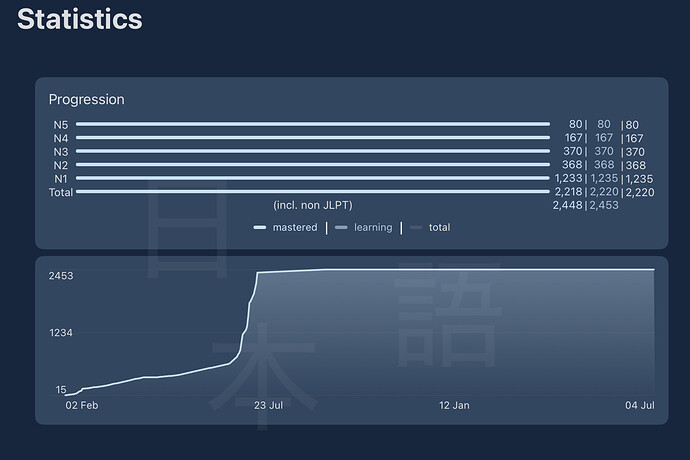I currently do Wanikani and Bunpro along with immersion and I would say I’m around N3 level (N2 listening). Only discovered Bunpro recently but how many new grammar and Vocab do you recommend to learn daily? Or how many grammar/vocab cards do you learn daily? Thank you!
Im also N3 and I did the first 80 grammar points on the first day because those are basicially obvious at that level. Then I did 20 a day when the grammar was easy (so up until N2) and then 6 a day from there on, or 3 a day when there were one or two hard ones just to avoid burn-out and because I could afford it due to the big head start.
So yeah, go through the first few hundred easy ones quickly and then slow your pace down.
With this routine I was at around 20-35 reviews a day (except for the first and second day because of the 80 grammar points pace at the very start)
As for vocab, just keep your current anki pace or whatever you are using.
The easy part is adding new reviews. The hard part is solidifying words and grammar points that have similar construction or meaning once you have them in the medium term memory bucket and they begin to cause recall interference. It’s a lot harder to learn similar things than completely separate things. Scale up gradually so you don’t get hit by a review tsunami a few weeks into the future. Set a maximum time limit and stop adding new reviews if you hit your limit or start to feel like you’re force feeding your brain with shovel fulls of content. Tilt your balance towards immersion over reviews. The more active your learning method is, the better it sticks.
I’m doing about 20-25 per week(together with the wanikani vocab). I don’t think that learning 20 words per day without using them would work for me. I make 3-6 grammar points per week, but use also other sources to learn about them. With every word or grammar point I learn, I try to write random sentences just to use and solidify them. Or I try to implement them somehow into my daily japanese diary. Somehow that works better than blasting through Anki for me. I’m doing this as hobby so I’m not trying to burn myself out
Just keep in mind the most important thing is keeping your review pile at 0.
As long as you can maintain studying all of your review material daily, feel free to add more lessons.
Only add new material when at 0 reviews.
To give my two cents, I agree with everything you said but I disagree with “The hard part is solidifying words and grammar points that have similar construction”. Vocab/grammar that are similar are usually easier to remember imo, mainly because you have a direct reference point. I guess if you try bruteforce everything without any method to study then it will be harder, but I dont really recommend that anways
My original advice was under the assumption that he is N3, which should be considered if you want to give advice. He probably already knows alot of grammar, so starting slow will just hold him back
Everyone’s study method is personal and what works for one person doesn’t always work for another.
My intent was to give general study heuristics based on my own experience. Starting with a comprehension level of about N3 and a vocabulary of about 7k, I added all grammar points from N5 to N1 within the space of several months as well as doing the same with kanji and a lot of vocab. I personally ran into a lot of recall interference trying to remember things with similar meanings.
My experience with interference seems to back up what I’ve read about in the book Your Memory : How It Works and How to Improve It Paperback – March 2, 2001, but I’d have to dig a bit to locate exact quotes.
Can you explain what the graph is showing?
Anways, what I meant was that I personally am not having a hard time with similar sounding words because of easy mnemonics, which makes sense to me since I have a constant reference.
Simple example: かえる “Return”, “Change”, “Replace”, and “Frog”
The story of the princess and the frog perfectly fits as a single mnemonic here lol.
And context makes the meaning obvious anyways. Like, when actually reading or listening Im not going to confuse “Frog” with “Change.” and that is basicially the same for all homophones.
Im not sure how many words you learn a day, but interference only becomes a big problem if you push alot of vocab quickly.

